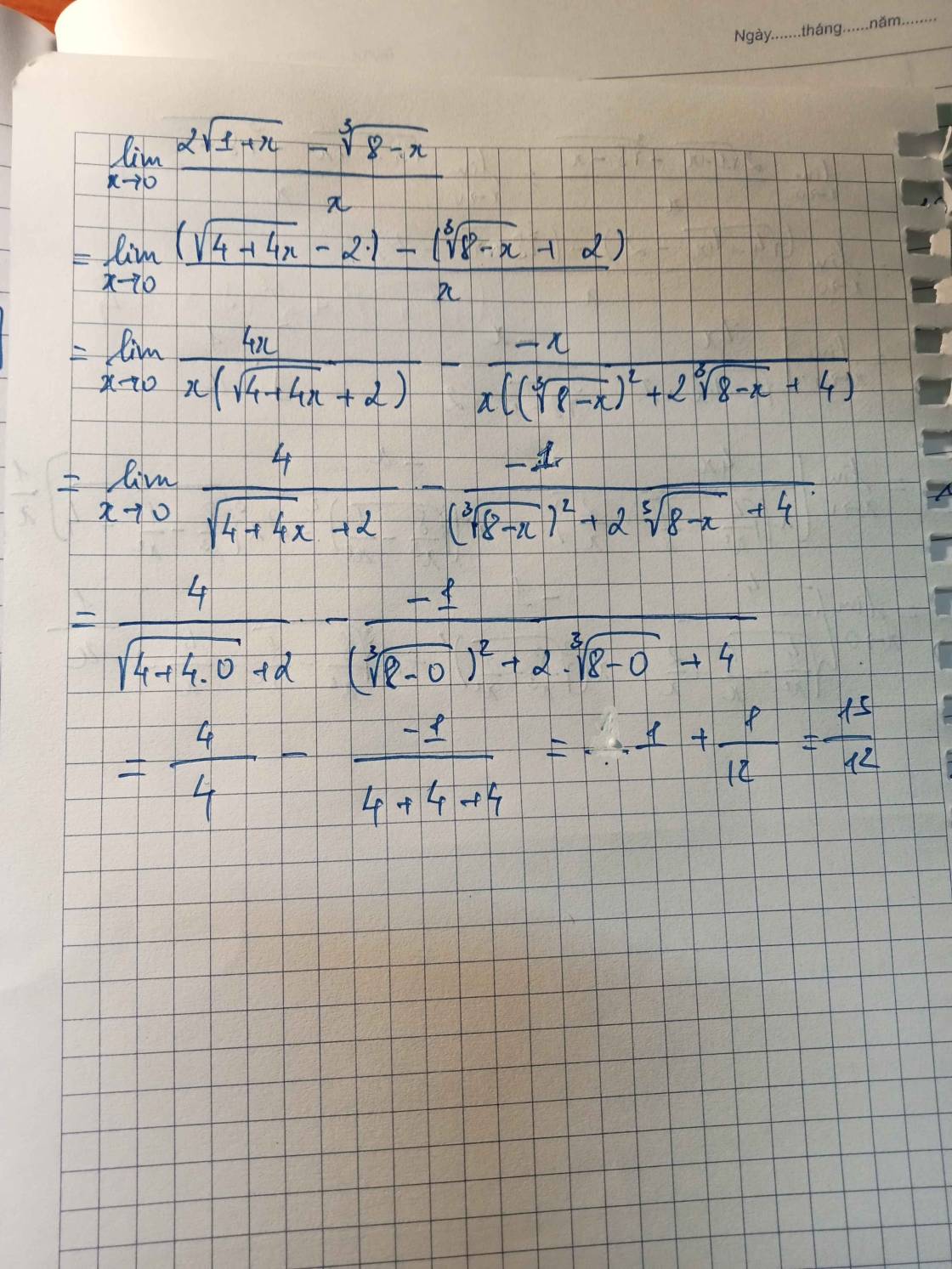Tính giới hạn\(\lim\limits_{x\rightarrow0}\dfrac{ \cos2018x-cos2019x}x\)
Hãy nhập câu hỏi của bạn vào đây, nếu là tài khoản VIP, bạn sẽ được ưu tiên trả lời.


\(\lim\limits_{x\rightarrow0}\dfrac{\sqrt{x^2+1}-\left(x+1\right)}{2x^2-x}=\lim\limits_{x\rightarrow0}\dfrac{\left(\sqrt{x^2+1}-\left(x+1\right)\right)\left(\sqrt{x^2+1}+x+1\right)}{x\left(2x-1\right)\left(\sqrt{x^2+1}+x+1\right)}\)
\(=\lim\limits_{x\rightarrow0}\dfrac{-2x}{x\left(2x-1\right)\left(\sqrt{x^2+1}+x+1\right)}\)
\(=\lim\limits_{x\rightarrow0}\dfrac{-2}{\left(2x-1\right)\left(\sqrt{x^2+1}+x+1\right)}\)
\(=\dfrac{-2}{\left(0-1\right)\left(\sqrt{1}+1\right)}=1\)
a. \(\lim\limits_{x\rightarrow2}\dfrac{x-2}{x^2-4}=\lim\limits_{x\rightarrow2}\dfrac{x-2}{\left(x-2\right)\left(x+2\right)}=\lim\limits_{x\rightarrow2}\dfrac{1}{x+2}=\dfrac{1}{4}\)
b. \(\lim\limits_{x\rightarrow3^-}\dfrac{x+3}{x-3}=\lim\limits_{x\rightarrow3^-}\dfrac{-x-3}{3-x}\)
Do \(\lim\limits_{x\rightarrow3^-}\left(-x-3\right)=-6< 0\)
\(\lim\limits_{x\rightarrow3^-}\left(3-x\right)=0\) và \(3-x>0;\forall x< 3\)
\(\Rightarrow\lim\limits_{x\rightarrow3^-}\dfrac{-x-3}{3-x}=-\infty\)

Tui nghĩ cái này L'Hospital chứ giải thông thường là ko ổn :)
\(M=\lim\limits_{x\rightarrow0}\dfrac{\left(1+4x\right)^{\dfrac{1}{2}}-\left(1+6x\right)^{\dfrac{1}{3}}}{1-\cos3x}=\lim\limits_{x\rightarrow0}\dfrac{\dfrac{1}{2}\left(1+4x\right)^{-\dfrac{1}{2}}.4-\dfrac{1}{3}\left(1+6x\right)^{-\dfrac{2}{3}}.6}{3.\sin3x}\)
\(=\lim\limits_{x\rightarrow0}\dfrac{-\dfrac{1}{4}.4\left(1+4x\right)^{-\dfrac{3}{2}}.4+\dfrac{2}{9}.6.6\left(1+6x\right)^{-\dfrac{5}{3}}}{3.3.\cos3x}\)
Giờ thay x vô là được
\(N=\lim\limits_{x\rightarrow0}\dfrac{\left(1+ax\right)^{\dfrac{1}{m}}-\left(1+bx\right)^{\dfrac{1}{n}}}{\left(1+x\right)^{\dfrac{1}{2}}-1}=\lim\limits_{x\rightarrow0}\dfrac{\dfrac{1}{m}.\left(1+ax\right)^{\dfrac{1}{m}-1}.a-\dfrac{1}{n}\left(1+bx\right)^{\dfrac{1}{n}-1}.b}{\dfrac{1}{2}\left(1+x\right)^{-\dfrac{1}{2}}}=\dfrac{\dfrac{a}{m}-\dfrac{b}{n}}{\dfrac{1}{2}}\)
\(V=\lim\limits_{x\rightarrow0}\dfrac{\left(1+mx\right)^n-\left(1+nx\right)^m}{\left(1+2x\right)^{\dfrac{1}{2}}-\left(1+3x\right)^{\dfrac{1}{3}}}=\lim\limits_{x\rightarrow0}\dfrac{n\left(1+mx\right)^{n-1}.m-m\left(1+nx\right)^{m-1}.n}{\dfrac{1}{2}\left(1+2x\right)^{-\dfrac{1}{2}}.2-\dfrac{1}{3}\left(1+3x\right)^{-\dfrac{2}{3}}.3}\)
\(=\lim\limits_{x\rightarrow0}\dfrac{n\left(n-1\right)\left(1+mx\right)^{n-2}.m-m\left(m-1\right)\left(1+nx\right)^{m-2}.n}{-\dfrac{1}{2}\left(1+2x\right)^{-\dfrac{3}{2}}.2+\dfrac{2}{9}.3.3\left(1+3x\right)^{-\dfrac{5}{3}}}=....\left(thay-x-vo-la-duoc\right)\)

Ko sử dụng L'Hopital:
\(\lim\limits_{x\rightarrow0}\dfrac{1-cosx+cosx\left(1-cos2x\right)}{x^2}=\lim\limits_{x\rightarrow0}\dfrac{2sin^2\dfrac{x}{2}+2cosx.sin^2x}{x^2}\)
\(=\lim\limits_{x\rightarrow0}\dfrac{1}{2}\left(\dfrac{sin\dfrac{x}{2}}{\dfrac{x}{2}}\right)^2+\lim\limits_{x\rightarrow0}2cosx\left(\dfrac{sinx}{x}\right)^2=\dfrac{1}{2}.1^2+2.1.1^2=\dfrac{5}{2}\)

làm bài lim xem nào :)))
P/s Sở Kiều :))
Hướng làm thôi chứ gõ công thức lâu vl
\(\lim\limits_{x\rightarrow0}\dfrac{\sqrt{x^2+x+1}-\sqrt[3]{x^3+1}}{x}\)
\(=\lim\limits_{x\rightarrow0}\dfrac{\sqrt{x^2+x+1}-1}{x}+\dfrac{1-\sqrt[3]{x^3+1}}{x}\)
Đến đây liên hợp là xong phần của bạn đó ;)

\(A=\lim\limits_{x\rightarrow0}\dfrac{\left(x^2+2017\right)\left(\sqrt[5]{1-5x}-1\right)+x^2}{x}\)
\(=\lim\limits_{x\rightarrow0}\dfrac{-\dfrac{5x\left(x^2+2017\right)}{\sqrt[5]{\left(1-5x\right)^4}+\sqrt[5]{\left(1-5x\right)^3}+\sqrt[5]{\left(1-5x\right)^2}+\sqrt[5]{1-5x}+1}+x^2}{x}\)
\(=\lim\limits_{x\rightarrow0}\left(-\dfrac{5\left(x^2+2017\right)}{\sqrt[5]{\left(1-5x\right)^4}+\sqrt[5]{\left(1-5x\right)^3}+\sqrt[5]{\left(1-5x\right)^2}+\sqrt[5]{1-5x}+1}+x\right)\)
\(=-2017\)
dễ thấy hàm số trên có dạng 0/0
áp dụng quy tắc l'Hôpital
\(A=_{\lim\limits_{x\rightarrow0}\dfrac{\left(x^2+2017\right)\sqrt[5]{1-5x}-2017}{x}=\lim\limits_{x\rightarrow0}\dfrac{\left(\left(x^2+2017\right)\sqrt[5]{1-5x}-2017\right)'}{\left(x\right)'}}\)
\(A=\lim\limits_{x\rightarrow0}\dfrac{-x^2-2017}{\sqrt[5]{\left(1-5x\right)^4}}+2x\sqrt[5]{1-5x}=\dfrac{-2017}{1}=-2017\)

1: \(A=\dfrac{x^2-\left(a+1\right)x+a}{x^3-a^3}\)
\(=\dfrac{x^2-xa-x+a}{\left(x-a\right)\left(x^2+ax+a^2\right)}\)
\(=\dfrac{\left(x-a\right)\left(x-1\right)}{\left(x-a\right)\left(x^2+ax+a^2\right)}=\dfrac{x-1}{x^2+ax+a^2}\)
\(lim_{x->a}A=lim_{x->a}\left(\dfrac{x-1}{x^2+ax+a^2}\right)\)
\(=\dfrac{a-1}{a^2+a^2+a^2}=\dfrac{a-1}{3a^2}\)
2: \(B=\dfrac{1}{1-x}-\dfrac{3}{1-x^3}\)
\(=\dfrac{-1}{x-1}+\dfrac{3}{x^3-1}\)
\(=\dfrac{-x^2-x-1+3}{\left(x-1\right)\left(x^2+x+1\right)}=\dfrac{-x^2-x+2}{\left(x-1\right)\left(x^2+x+1\right)}\)
\(=\dfrac{-\left(x+2\right)\left(x-1\right)}{\left(x-1\right)\left(x^2+x+1\right)}=\dfrac{-x-2}{x^2+x+1}\)
\(lim_{x->1}\left(B\right)=\dfrac{-1-2}{1^2+1+1}=\dfrac{-3}{3}=-1\)
3: \(C=\dfrac{\left(x+h\right)^3-x^3}{h}=\dfrac{\left(x+h-x\right)\left(x^2+2xh+h^2+x^2+hx+x^2\right)}{h}\)
\(=3x^2+3hx\)
\(lim_{h->0}\left(C\right)=3x^2+3\cdot0\cdot x=3x^2\)

a: \(\lim\limits_{x->0^-^-}\dfrac{-2x+x}{x\left(x-1\right)}=lim_{x->0^-}\left(\dfrac{-x}{x\left(x-1\right)}\right)\)
\(=lim_{x->0^-}\left(\dfrac{-1}{x-1}\right)=\dfrac{-1}{0-1}=\dfrac{-1}{-1}=1\)
b: \(=lim_{x->-\infty}\left(\dfrac{x^2-x-x^2+1}{\sqrt{x^2-x}+\sqrt{x^2-1}}\right)\)
\(=lim_{x->-\infty}\left(\dfrac{-x+1}{\sqrt{x^2-x}+\sqrt{x^2-1}}\right)\)
\(=lim_{x->-\infty}\left(\dfrac{-1+\dfrac{1}{x}}{-\sqrt{1-\dfrac{1}{x^2}}-\sqrt{1-\dfrac{1}{x^2}}}\right)=\dfrac{-1}{-2}=\dfrac{1}{2}\)

\(\lim\limits_{x\rightarrow0}\dfrac{x^2-3}{x^3+x^2}\)
\(=-\infty\) vì \(\left\{{}\begin{matrix}\lim\limits_{x\rightarrow0}x^3+x^2=0^3+0^2=0\\\lim\limits_{x\rightarrow0}x^2-3=0^2-3=-3< 0\end{matrix}\right.\)
Nguyễn Lê Phước Thịnh , nhưng sao tui tính lim trái, lim phải nó ra khác nhau nhỉ. Vậy thì có tồn tại lim ko ta???

\(\lim\limits_{x\rightarrow0}\dfrac{2\sqrt{1+x}-\sqrt[3]{8-x}}{x}\)
\(=\lim\limits_{x\rightarrow0}\dfrac{\sqrt{4+4x}-\sqrt[3]{8-x}}{x}\)
\(=\lim\limits_{x\rightarrow0}\dfrac{\sqrt{4+4x}-2+2-\sqrt[3]{8-x}}{x}\)
\(=\lim\limits_{x\rightarrow0}\dfrac{\dfrac{4x+4-4}{\sqrt{4x+4}+2}+\dfrac{8-8+x}{4+2\cdot\sqrt[3]{8-x}+\sqrt[3]{\left(8-x\right)^2}}}{x}\)
\(=\lim\limits_{x\rightarrow0}\dfrac{\dfrac{4x}{\sqrt{4x+4}+2}+\dfrac{x}{4+2\cdot\sqrt[3]{8-x}+\sqrt[3]{\left(8-x\right)^2}}}{x}\)
\(=\lim\limits_{x\rightarrow0}\dfrac{4}{\sqrt{4x+4}+2}+\dfrac{1}{4+2\cdot\sqrt[3]{8-x}+\sqrt[3]{\left(8-x\right)^2}}\)
\(=\dfrac{4}{\sqrt{4\cdot0+4}+2}+\dfrac{1}{4+2\cdot\sqrt[3]{8-0}+\sqrt[3]{\left(8-0\right)^2}}\)
\(=\dfrac{4}{2+2}+\dfrac{1}{4+2\cdot2+4}\)
\(=1+\dfrac{1}{12}=\dfrac{13}{12}\)

Bn biến đổi lms ra đc thế vậy
\(=\lim\limits_{x\rightarrow0}\frac{-2sin\frac{4037x}{2}.sin\frac{x}{2}}{x}=\lim\limits_{x\rightarrow0}\left(-sin\frac{4037x}{2}.\frac{sin\frac{x}{2}}{\frac{x}{2}}\right)=0.1=0\)
Mẫu là \(x^2\) thì có vẻ đẹp hơn :)